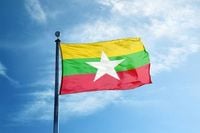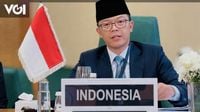A powerful earthquake measuring 7.7 on the Richter scale struck Myanmar on March 28, 2025, resulting in a devastating humanitarian crisis. The quake, centered near Mandalay, the country’s second-largest city, has left at least 1,700 people dead, over 3,400 injured, and more than 300 missing, according to reports from the military government.
The U.S. Geological Survey confirmed that a subsequent tremor measuring 5.1 struck the region just two days later, on March 30, 2025, approximately 13 miles northwest of Mandalay. Fortunately, no immediate reports of significant damage or casualties were associated with this aftershock. However, the situation remains dire as aid teams mobilize to assist the impoverished nation in the wake of the initial disaster.
In response to the catastrophic earthquake, the military council in Myanmar reported that the recent disaster is among the strongest the region has experienced in a century. The council's head, Min Aung Hlaing, has warned that the death toll may continue to rise as rescue efforts unfold. He made a rare appeal for international assistance, highlighting the urgent needs of the affected population.
The international community has rallied to provide aid, with neighboring countries such as India, China, and Thailand sending rescue teams and supplies. The United States has pledged $2 million in humanitarian assistance, with a rapid response team from the U.S. Agency for International Development set to deploy to Myanmar. This assistance is crucial as the country grapples with the aftermath of the earthquake while still embroiled in a civil conflict that has displaced over 3.5 million people.
As ASEAN's president for 2025, Malaysia convened an emergency meeting of foreign ministers on March 30 to coordinate a collective response to the disaster. Malaysian Foreign Minister Mohamed Hassan emphasized ASEAN's unity and solidarity in the face of this crisis. He and his Thai counterpart are scheduled to visit Myanmar on April 5 to assess the situation and facilitate aid delivery.
Indonesia has also stepped up, with Foreign Minister Retno Marsudi announcing the country’s readiness to assist Myanmar and Thailand. Indonesia plans to send an Urban Search and Rescue (USAR) team and an Emergency Medical Team (EMT), along with logistical support valued at $1 million. The Indonesian government is coordinating these efforts through the ASEAN Humanitarian Assistance Center to ensure a comprehensive and effective response.
Singapore's response included deploying a team of 80 personnel from the Singapore Civil Defence Force to assist in search and rescue operations. The team arrived in Naypyidaw on March 29, and the Singaporean government has committed an initial humanitarian aid package of 150,000 Singapore dollars to support earthquake victims.
Thailand has also mobilized its military, with 49 soldiers dispatched to Mandalay, Naypyidaw, and Yangon to coordinate humanitarian efforts and deliver aid. The Thai government is working closely with Malaysia and Singapore to ensure that essential supplies, including food and medical aid, reach those affected by the earthquake.
Meanwhile, Vietnam announced it would send a team of 79 soldiers to Myanmar, comprising specialists in communications, search and rescue, and medical personnel. This deployment reflects Vietnam's commitment to international humanitarian cooperation.
Amid the chaos, the ongoing civil war in Myanmar complicates recovery efforts. The conflict, which erupted after the military coup in 2021 that ousted the elected government of Aung San Suu Kyi, has already devastated the country’s infrastructure and economy. The recent earthquake has exacerbated these challenges, further straining the nation's limited resources.
As international aid pours in, the need for coordinated and efficient distribution is paramount. The ASEAN Coordinating Center for Humanitarian Assistance on disaster management has initiated a coordinated international operation to ensure that relief efforts are effectively managed and reach those in need.
In a statement, Indonesian Foreign Minister Sujiwono stressed the importance of regional cooperation in disaster response, urging all ASEAN member states to set aside differences and work together for the greater good. He highlighted the need for long-term coordination to ensure that recovery efforts are sustainable and effective.
As the situation develops, the humanitarian crisis in Myanmar continues to unfold, with many families still searching for loved ones and grappling with the loss of homes and livelihoods. The international community's response will be crucial in the coming weeks and months as Myanmar seeks to recover from this tragic event.
In summary, the earthquake in Myanmar has not only caused immediate devastation but has also highlighted the urgent need for humanitarian assistance in a country already facing significant challenges. As aid efforts ramp up, the resilience of the Myanmar people and the solidarity of the international community will be tested in the days ahead.








